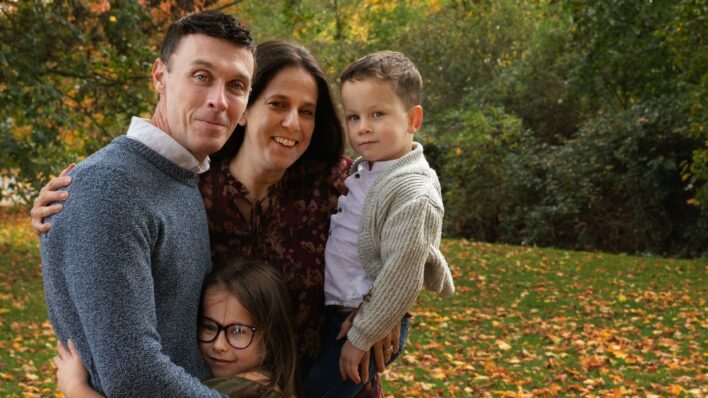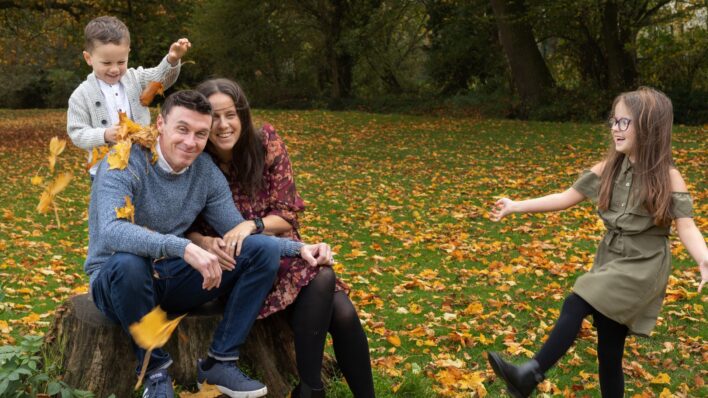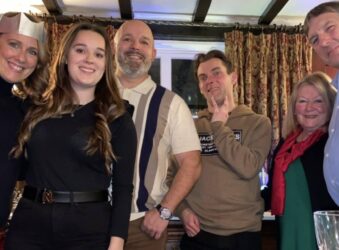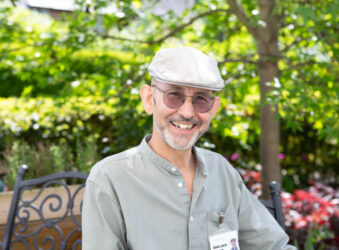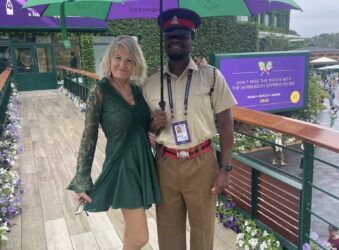Lee’s story
Share this story
Lee was diagnosed with bulbar onset MND, which affects your speech first, in December 2019. He is still loving life and tells us his story of determination and hope.
Meet Lee
“I’m Lee. I’m 43 years old. I’ve been married now for 6 years and we have two beautiful, wonderful children. We have a daughter who’s seven years old and a son who’s three years old.
Prior to MND (and with MND) we love being together as a family. We go for walks and we do paddle boarding. The kids love the skatepark and we love growing vegetables and fruit, drawing, movie nights and family holidays.”

What provides his inspiration and motivation?
“I’ve been into fitness for most of my life. I’ve always enjoyed it and I still do it now, just at a slower rate. It’s more for maintenance than anything else. It keeps me motivated, and it keeps me determined.
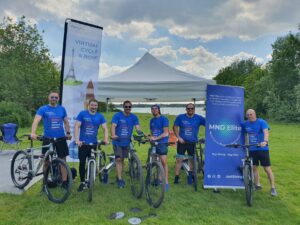
It’s really important for me as a father, to show my children that although I have MND life goes on and you just have to adapt. For me to give up in front of them would send a very negative message. If I can remain positive and focused through adversity, then in years to come my family and my friends will be able to tell my story: that although I was dying, I never gave up and I still had great passion for life.
The main thing I want to show my children is that although they saw their father’s health deteriorate, my spirit won’t be broken. I remain positive. In a wheelchair, on a ventilator, whatever. I’m still dad and the best version of me that I can be at that moment of time.”
How did he discover he had MND?
“It wasn’t that clear-cut because back then my speech wasn’t that bad as it is now. I had had some dental work done and I was told that one of the side-effects was that my speech might be a little bit off for a while.
I’d also been training in the gym harder, and I had been lifting heavier weights and I had a twinge in my arm, which I thought was a bit of fatigue. Then I had another twinge in my right arm.
I remember quite clearly it was a Sunday afternoon and my family and I sat down for Sunday dinner and I choked on food, which I’ve never done before. It was really quite frightening.
With a twinge in my left arm, in my right arm, my speech, and the choking I thought ‘hmm something isn’t quite right here’. So, I went to the doctors and I got referred to a neurologist and that’s when I was diagnosed with bulbar onset MND. Bulbar onset MND affects the speech first more than anything else.”
How did he feel when he received the diagnosis?
“I remember it like yesterday. The first thing that came out of my mouth was, “so I’m a dead man walking”. I think that was fear and shock.
You know, I didn’t think it was anything major. I didn’t feel any different. I knew my speech was off, and I thought maybe it was MS. But I knew that when a neurologist says that you’ve got MND, it’s not a diagnosis that they handout freely.
I was an absolute wreck. I think everyone was quite stunned. Sad, and upset.”
How have his feelings changed since then?
“I’m quite logical, so the first thing I said to myself was:
‘Right, make sure your mental state is on point. Get that sorted out – up here – make sure your mindset and your foundation is right and from there it is like building blocks’.
It’s important to me that, I keep doing what I’m doing and do the best I can.
My wife said now that I’ve changed 100%. I’m really content, very content, I’m living, I’m moving, just at a slower rate, but I’m alive! I’ve got to say to you I’m loving life. If MND puts me in a wheelchair, if MND puts me on a ventilator, if MND puts me on a PEG feed, I’m still breathing, I’m still living.”
How did he find out about Arthur Rank Hospice Charity?
“I come to your hospice, every three months for my MND review, that’s how I know about the Hospice, but I first heard about you through the Cambridge MND branch, they told me about you guys.
I must admit, when I was told that I was going to go to a hospice (smiles) for my medical review, I did think ‘Hospice. Hospice? right okay…’.
But, well, when I got there, woah, amazing. The chocolate brownie and the coffee they were great. I told my wife “I’m moving there tomorrow”! It’s so nice there, it really is.”
He has plans..
“I want to raise money for the Hospice’s Living Well Service, which I know will play a part as my symptoms progress. As you are a Charity, I feel that if you guys are going to be helping me, I’m going to help you!
So, event one, which I will be doing in June this year, is the ‘Mount Kilimanjaro Step Challenge’, which is about 147,000 steps. On a good day I can do about between 7000-8000 steps. What I’m aiming to do is around 20 to 25,000 steps a day and I’m going to make it harder for myself: the first 5,000 steps I’m going to put a 5kg weight in my backpack and then for the rest of it I’m going to put a 10 kg weight in my backpack, to make it more authentic.
And then the second challenge: I aim to do a marathon or a half marathon in a wheelchair. I’m not wheelchair-bound at the moment but I know that element will be a part of my life very soon. I will be in a wheelchair. So, what better way to embrace that element than to do a marathon or half marathon in a wheelchair.”
Leaving a legacy
“I’ve got a wife and two children and they need me to be around for as long as possible. By doing what I am doing, it’s the easiest and most simple way to leave a legacy for them. By being positive and being motivated I think it will help them in years to come, when I’m not here anymore.
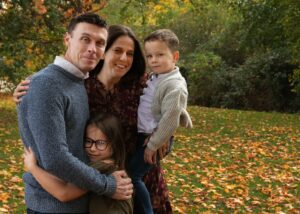
Just to be able to look back on what I’ve done and what I’ve achieved. When my children are older and they say:
“Mum, why have I got to do this?” and “Why have I got to do that?”
[she can say] “Well your dad had MND and he did this, this and this. Don’t think there is anything you can’t do!”
So, I think it will help my wife in years to come as well.”
Some final thoughts
“The first thing I think you’ve got to do is accept your diagnosis. I don’t want people to think that I’m saying that accepting your diagnosis is easy, because it’s not. But, by doing that, you can live more freely.
 In my book, ‘MND Navigate, Your Mindset Matters’, which I’m hoping to published in October, I’ve got a couple of messages:
In my book, ‘MND Navigate, Your Mindset Matters’, which I’m hoping to published in October, I’ve got a couple of messages:
‘I have one chance of being terminally ill, I intend to make the most of it!’
‘With a terminal illness comes great responsibility. You need to be positive through adversity- everyone else around you will follow.’
‘MND does not stand for motor neurone disease, it stands for motivation, no negativity and determination’.
And the most dominant quote in my book is:
‘Don’t live for today, it’s too short term. Just live’.”
If you would like to find out more about Lee, join him on his journey or send messages of support, you can find him on Twitter here: https://twitter.com/MndElite.
To follow and support Lee in his journey visit his blog by searching for @MNDNavigate on Twitter.
You can read more about his fundraising challenges HERE
You can read more about his fundraising and donate at https://uk.virginmoneygiving.com/LeeMND
Read about his Wheelchair Challenge which he completed with the help of volunteers in October 2021.
View other stories
-

Hospice supporter climbs Snowdon in memory of her Uncle Piers
Molly is inspired to fundraise in memory of her Uncle Piers
-

Living Well Patients at the Hospice relax with Meditation
David Lynch from The Mindful Green Coach, visits the Living Well Service
-

Cambridge Hospice Volunteer supports with pre-loved fashion at Wimbledon Tennis Tournaments in London
Volunteer, Nadia Macari-Brown supports the Charity at one of the most famous sporting events in the world
-

Russell shares his Living Well experience
"There’s a very, very good and tight family atmosphere here"

